A pile of snails sold to a picked-up canteen manager. A corpse tossed into a mass murderer's bed. Laughter. But only laughter through tears.
In the early 1970s, doctors Zenon Jagoda, Stanisław Kłodziński and Jan Masłowski, who studied trauma in concentration camp victims, sent out a questionnaire to former Auschwitz prisoners with questions about the role of humor in camp life. It would seem that discussing such a topic inevitably leads to diminishing the suffering of prisoners and undermining the seriousness of the tragedy that was the Holocaust.
Meanwhile, the results of the study proved that humor in the camp was not only present, but also fulfilled an important task . It became a form of self-defense, strengthened solidarity, and even made it possible to find a moment of respite. It was, however, a special humor. The prisoners themselves wrote about him: bitter, macabre, gallows, crematorium . The first contact with the camp's sense of humor was often a huge shock for them.
Cruel laugh
It should be remembered that prisoners' humor was often an expression of revenge for the cruel and inhuman "jokes" that happened to the imprisoned SS men. The stories quoted by former prisoners, describing how the camp guards humiliated them only for their own amusement, are terrifying. Former Auschwitz prisoner Artur Rablin reported that one day they ordered one of his fellow prisoners to eat a live mouse for fun. Another time, in Birkenau, prisoners caught flirting were forced to kiss each other for an hour ... all to keep the SS men entertained.
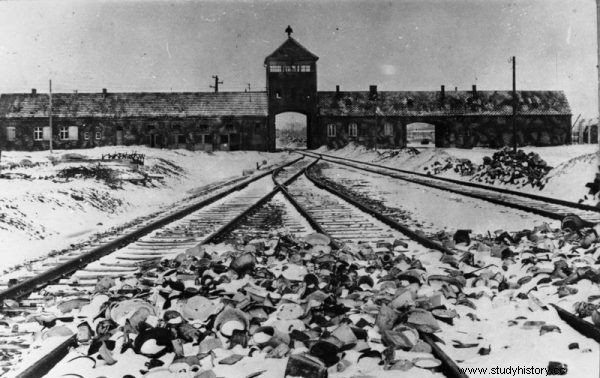
Arriving at the camp meant entering a different, macabre world. The encounter with the rules governing it, as well as with a special "camp" sense of humor, was a huge shock for the prisoners (photo:Stanisław Mucha, Bundesarchiv, license CC BY-SA 3.0 DE)
Often, laughter was also simply an expression of indifference to human harm. Such a story was quoted by Krystyna Żywulska in her memoirs. She started working in the sauna. Her first task was to wipe the windows. After a while, she realized that Magda, a Slovak Jewish woman who hired her to work, was laughing at her:
Magda was standing nearby and roaring strangely. I looked back. I realized she was laughing at me. I must have looked comical, because I had no strength at all, and rubbing the windows, I was holding on to their hands so as not to fall down again. It clearly amused her.
Forbidden Jokes
The prisoners contrasted the brutal behavior of the guards with their own "jokes". Expressions of such humor were severely exterminated. This is shown by the story of Marek Godlewski, one of the heroes of the reportage "Dobranoc, Auschwitz". When asked about the progress in the block lice hunting (prisoners were supposed to kill them with a hot 100 Watt bulb), he replied humorously: I did not find lice, but the flea nest! The block supervisor "paid" him for this mockery with a strong kick.
Jokes on the part of prisoners were always quite risky. But those who nevertheless found the strength to joke are remembered by others with emotion. The figure mentioned many times was Czesław Sowul, a prisoner from the first transport, performing the function of a paramedic and playing in the camp orchestra.
There were also those who could tell interesting stories and, at least for a moment, distract the thoughts of prisoners from the terrible everyday life, such as Xawery Dunikowski, who reminisces about his stays in Paris, or Adam Brodziński, Pola Negri's secretary, who told anecdotes about her life. The blind writer, Bronisław Mróz ‑ Długoszewski, reportedly survived the camp only thanks to his ability to chat!
A form of self-defense
The authors of the survey emphasized that humor in the camp was a form of self-defense. The prisoners, by ridiculing their torturers, undermined their authority and at the same time took revenge for their bestial behavior. Jerzy Pozimski recalled that during his stay in the camp, he managed to convince the kommandoführer of the canteen that in the snails he was so disgusted with, you can find ... pearls!
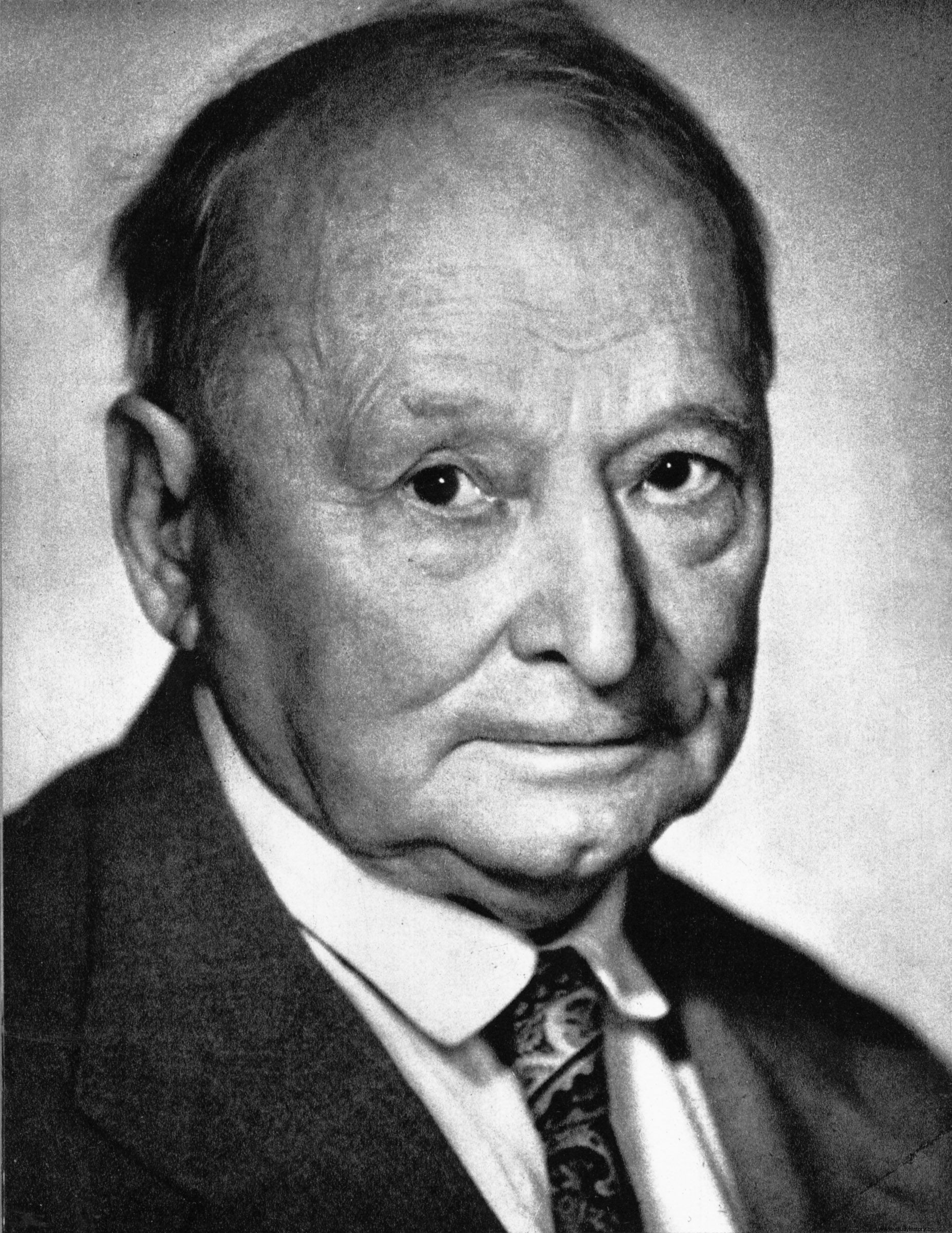
The sculptor Xawery Dunikowski was also mentioned among the camp prisoners who were warmly remembered for their ability to tell interesting stories. (photo:Benedykt Jerzy Dorys, source:public domain)
Finding one, planted "as an encouragement" by the prisoners, the kommandoführer spent the whole night cutting and digging up 5 kg of snails bought from prisoners.
In turn, Mieczysław Pańszczyk, who used SS doctors and killed hundreds of prisoners by injecting them with phenol, was taunted, putting the body of one of his victims to his bed . Attached to them was a piece of paper that read: You pig - you will regret it!
Together against the Nazis
In the camp, jokes were also told about the highest commanders of the Third Reich. As in the ghettos, for example, the discrepancy between their appearance and that of the Aryan ideal was mocked. What should a true Nazi be like? Blond like Hitler, slender like Goering, tall like Goebbels, masculine like Roehm ... and so on.
This article has more than one page. Please select another one below to continue reading.Attention! You are not on the first page of the article. If you want to read from the beginning click here.
As emphasized by John Morreall, a philosopher and specialist in the field of humor studies, orally transmitted anecdotes integrated the group. This was also helped by the activities of… cabarets that appeared in the camps. They were often created by cabaret artists, sent to camps, among others, for their activities. Plays ridiculing the Nazis were staged - in Dachau in 1943, for six weeks, a program was presented whose protagonist was "Count Adolar", a poorly hidden parody of Adolf Hitler .
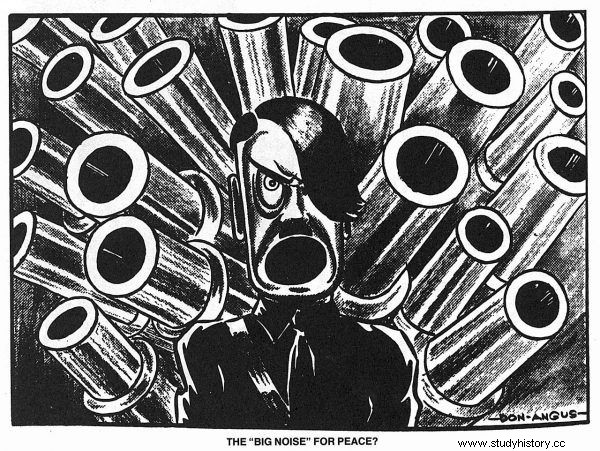
This particular caricature of Adolf Hitler by Angus dates back to before the war, but we know that there were also drawings in the camps ridiculing the Nazi leaders (source:public domain).
There were also "comic" elements that were simply to relax (as much as possible in inhumane conditions) and spend time together. Kazimierz Piechowski recalled a special form of "fun, games", for which ... his own fleas were recalled:
The prop in this game was a bowl, in the middle of which you had to put your louse. Before I could play this game, I had to pledge my piece of supper bread. What were the rules? The owner of the lice that first reached the rim of the bowl took away all the slices of bread.
Piechowski did not see much sense in this gambling, pointing out that it weakened the already damaged strength of those who had to go to bed without supper. Even so, there were usually people willing to play the game.
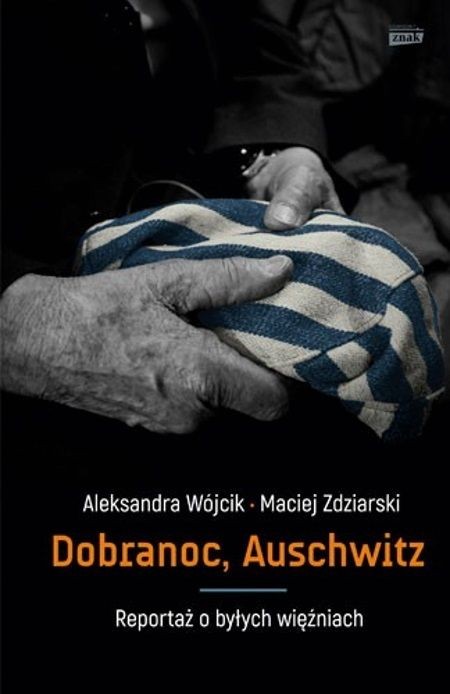
A moment of relaxation
Humor also acted as a way to release emotions. It was important for mental "hygiene":it helped to survive and not go crazy. It allowed me to find a moment of respite and break away from reality for a moment. A beautiful episode was quoted by Karol Tendera, a former prisoner of the Auschwitz camp. He went with a team of electricians to Birkenau to bring food to the prisoners. On the way he met a girl he met recently, Lusia:
We're kidding, laughing. I forget that we are in the camp, that there is a strict ban on talking to women, and breaking this ban may result in severe penalties. The girls don't remember it either. The real time and place move away from us, for these several minutes they do not exist.
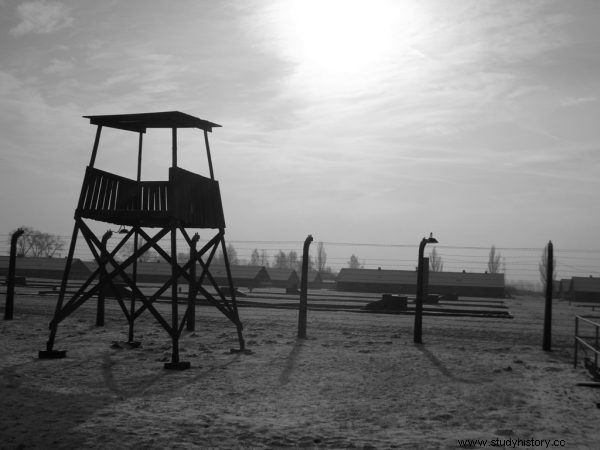
Although so many years have passed since the end of World War II, until today we discover previously unknown aspects of camp life (photo:Piotr Drabik, license CC BY 2.0).
This uplifting action led Viktor Frankl, an Austrian psychiatrist and psychotherapist, former inmate of the Theresienstadt, Auschwitz and Dachau camps, to consider humor as yet another weapon of the soul in the struggle for self-preservation . He also mentioned that he himself helped his friend, who worked next to him on a construction site, to develop a sense of humor. He even suggested that they should come up with at least one amusing story every day about an imaginary life after liberation.
Can you laugh everywhere?
Frankl was aware that his story might be surprising:
It must have been surprising enough for an Outsider to discover that there was something akin to art in the concentration camp, but it would probably surprise him even more that there was also a sense of humor there; of course, it was only a faint trace of it, and even then only for a few seconds, maybe minutes.
But since humor can help in so many ways, maybe it's not so strange that it can be found even where laughter seems impossible?
